Report from Asheville, Part One
I made two doughs in advance of the festival, on Thursday actually, and brought them with me on Saturday to Asheville, which is two hours northwest of Charlotte. Just prior to the demo we baked off some sandwich style loaf breads, and a few hearth style batards, and five pans of raisin and cranberry breakfast focaccia, all made exclusively with the sprouted wheat flour (my helpers included students from the excellent culinary program at A-B Tech, where we held a number of the classes, as well as some of my own students from Johnson & Wales University — they were all great! In fact, it was my students who made the doughs on Thursday).During the class, I showed how to use the flour and Joe Lindley answered questions about it.
Here’s the story on the flour, which was provided by Lindley Mills:
Anyone who has ever had Ezekiel Bread or Alvarado Street Bread knows about sprouted wheat, but this new flour is something different. Those aforementioned breads use wheat berries that have been sprouted and then mashed into a pulp, supplemented with vital wheat gluten, honey, salt, yeast, and water and, voila!, it makes a pretty decent bread without using any “flour” at all because the wheat is never actually ground into flour, only into a pulp. But with the new version of sprouted wheat flour that I used at the festival, on the other hand, it starts with sprouted wheat berries but then the berries are dried, and then the dried sprouts are milled into a very fine flour, and treated as flour from that point on. The amazing thing is how much water this new flour can absorb–typically around 90%-100% of the flour weight (as opposed to a typical 72%-75% for regular whole wheat flour, and only 65%-68% water to flour for white bread). More importantly, the flavor of this sprouted flour is unbelievable–sweet and tender — yet it forms a strong gluten network and is high in protein. I added no oil to tenderize it, no sugar or honey to sweeten it; it was perfect without any of those additions. In my opinion, it makes the best whole wheat bread I’ve ever eaten or made, and I think it definitely represents the next frontier in flour and bread making. The supply is limited right now so it’s not yet available for home bakers, as bakeries like Whole Foods and some other companies are buying all that the three mills who make it can produce (I’m even consulting now with a pizza company that wants to use it for their doughs–this flour makes fabulous pizza crust!). But, as the capacity of the mills increases, you should be able eventually to buy it directly from them or, hopefully, off the grocery store shelves. I will keep you up to date on this as the story unfolds but, when it becomes all the rage, remember that you heard it here first.
I’ll continue this next week, along with other highlights from the festival. Till then, may your bread always rise and may your pizzas all be perfect!
Recent Articles by Peter Reinhart
- Howard Brownstein on Turnaround and Crisis Management
- Randy Clemens and Forest Farming in Uruguay — The Back to The Earth Movement is Back!
- It’s not too late to chase your dreams: “Pizza From the Heart” A New Book by Paulie and Mary Ann Gee
- Kyle Ahlgren on the Artisan Baking Center Online Classes (and a special offer)
- Multi-James Beard Nominee Cathy Whims of Portland’s Nostrana and her Brand New Book
- Pizza Quest: KID, Manhattan’s New Slice Cafe, with Chefs Ian Coogan and Max Blackman-Gentile
Add Comment
You must be logged in to post a comment.




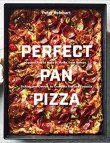
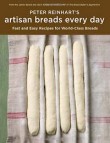
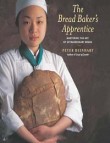
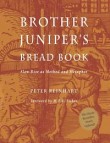
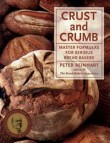
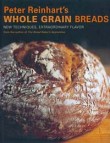
A belated update:
Attempt 2 – Standard focaccia recipe from Artisan Breads Everyday – I used 80% hydration for the bread flour and 100% for the sprouted. Great flavor and robust oven spring. I was a little concerned since the bench rise didn’t seem too great but final result was marvelous. FYI – I topped 1/2 with potato-rosemary and 1/2 with onion marmalade & chive Boursin. A huge hit.
Attempt 3 – Struan, also from ABED. I added a somewhat arbitrary 10% hydration for the sprouted flour and made a triple batch: 1 for overnight, another for 3 days later and the last for the freezer. The overnight bread was really wonderful, maybe the best thing I’ve ever baked. The bad news is that the dough at 72 hours was dreadful! Only a tiny amount of bench rise. Most of the flavors were gone, replaced by an unpleasant sour taste. I think the yeast chewed through all the sugars and left only alcohol.
Diane – How are you doing?
Sprouting wheat berries, dehydrating them, and then grinding into flour is pretty common among people who follow a raw food diets or who follow “traditional” diets advocated by people like Sally Fallon. I found this article because I was looking for a recipe for sprouted wheat pizza dough. I have a batch of sprouted wheat berries in my dehydrator as I type and will be grinding them into fresh flour as soon as they are dry. Fresh ground flour has an amazing flavor and it is significantly cheaper to buy your own wheat berries and sprout them yourself. Peter, I look forward to you developing some amazing recipes using your new find!
To make sprouted wheat flour be sure not to dry the sprouts any higher than about 119 degree F./48 degrees C. so that the enzymes are not destroyed (and by sprout, I mean just a small nub of a tail beginning to poke through–once the tail takes off and is as long as the wheat kernal you have a vegetable instead of a grain). Anyway, use a food dehyrator, if you have one, rather than the oven, which even on pilot light can get above 150 degrees F. Then, when they are totally dry, you can mill them into flour. The alternative is to grind the fresh, wheat sprouted wheat into a mash, as described in my book “Whole Grain Breads.” This is more like how Alvarado St. or Ezekiel Breads makes theirs, but is a totally different product. Both are great, but what I’m focusing on now is sprouted wheat (and other grain) flour, not mash. I’ll be reporting more on this in upcoming Blog postings. Keep us posted, Tunesia, Diane, Dmax and everyone as you continue to experiment.
Shiloh Farms has been selling Essential Eating sprouted flour in independant health food stores from Boston to D.C. for a couple of years. Some Whole Foods, too. Its a very high-quality certified organic flour that makes a wonderful bread. Pretzels and pasta made from this flour are also available. http://www.shilohfarms.com
News flash to fellow bakers. Essentialeating.com makes amazing sprouted flours are avalilable at Whole Foods, Wegmans and Publix. Sold by Shiloh Farms. Great baking characteristics. Only producer testing to assure sprout action!